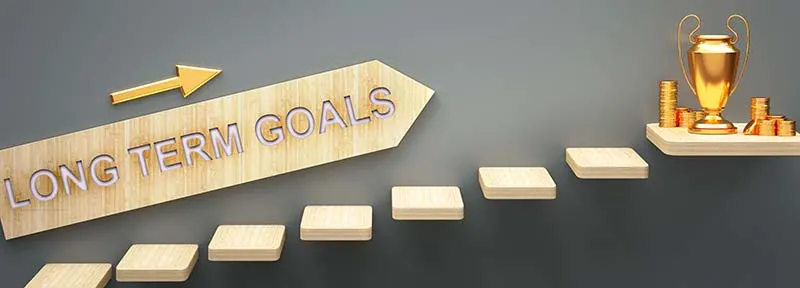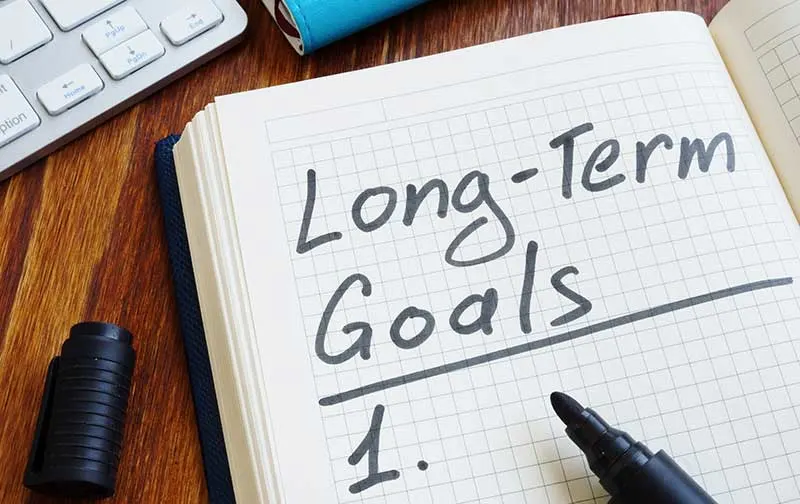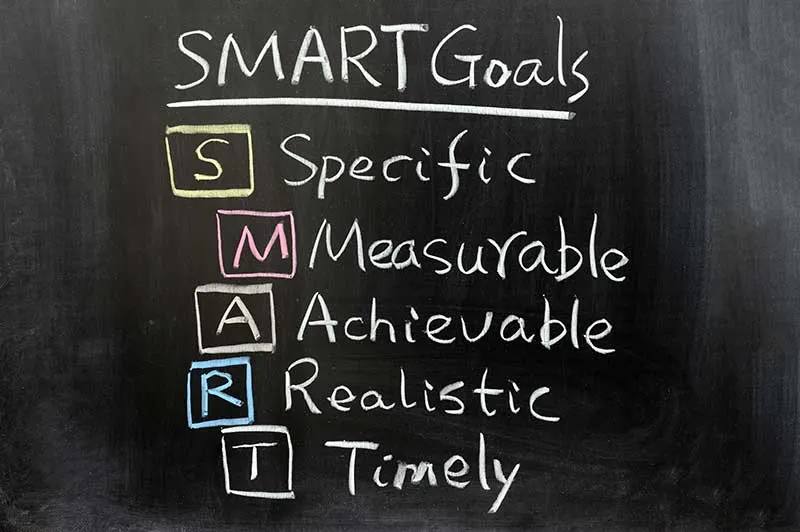
Most people setting goals think about what they can accomplish in the next few weeks. But big, important goals can change your life, and take over a year to accomplish. In earlier posts, I have outlined why it is important to think about medium and long-term goals. In this post, we will dive deep into long-term goals with examples that you can get inspiration from.
Table of Contents
What are long-term goals?
Long-term goals are goals that can take years to achieve, but can help transform and shape your life in whole new ways. When setting goals, most people think about setting new short-term goals such as meeting a sales quota, finding a date, losing weight or exercising more (goals that you can often achieve in less than a year).
However, important goals that can transform your life can take longer than a year to accomplish: starting a new career, moving to the city of your dreams, getting a new degree or starting a family are all long-term goals that can take years to achieve.
“Long-Term Goals Define Who You Become. They Define Your Success in Life”
Why do you need long-term goals?
Watch this video below where I explain why you need long-term goals, with several examples:
Setting long-term goals is important because it gives you long-term vision and helps make sure you live your life on purpose. You want to make sure that your career, your personal life and your family life are heading in a direction that will make you and your loved ones happy and fulfilled.
It also takes hard work and planning to make big dreams a reality. You don’t want to be sitting around wishing something good happens when you could be making sure that it does.
A career change might require new training, education, or networking with new people. Having long-term goals ensure you take the right short-term actions to deliver on that long-term promise.
“Set Short-Term Goals and You Will Win Games. Set Long-Term Goals and You Will Win Championships”

101+ examples of long-term goals
I’ve provided below a list of examples of long-term goals, organized by category.
Job interview: how to answer the popular “what are your long-term goals?” question
Job interviewers will often ask about your long-term goals. Nick Mottet, a Principal Manager who interviewed over 150 job applicants for a popular Fortune 100 company, explained: “The interviewer wants to know 1) how committed you are to the position and the company you are interviewing for, and 2) if you are ambitious and have plans”.
What’s a good answer? Your answer should provide specific details about how you would like to grow professionally within the company. You should also take this opportunity to show how passionate you are about your career and how you want to grow and evolve in the next 2-3 years. Be specific.
Two Examples of Long-Term Goal Interview Answers:
- Applying for an accounting position in a large clothing store: “In the short-term, I want to become an excellent accountant by improving my analytical skills. In the long-term, I’m interested in understanding how a clothing store makes a profit. Clothing stores operate in a challenging environment with fast-changing consumer trends. I would love to learn more about the logistics and financials of your store. In a few years, if I can prove myself as an excellent accountant, I would love to consider other positions such as “Assistant Manager” (Shows realistic ambition, passion and commitment to the company).
- Applying for a social media management position: “I love creativity. I think a great long-term goal for me is to evolve into a Senior Marketing Manager position in your company, where I can continue to be involved with social media management, but also be responsible for creative advertising and branding. If I get accepted for the social media management position, I would love to continue to learn about creative marketing so that I can evolve in your company” (Shows ambition, passion and commitment to the company).
Long-term career goal examples

Are you tired of your run-of-the-mill office routine? Do you dread Mondays and keep dreaming of Fridays? These are the signs that you’ve become stagnant in your career. The solution? New long-term career goals to drive yourself forward. Ask yourself: where do I see myself in the next five years? List your objectives and the means to achieve them. Now you have something to work towards and a reason to push yourself. Here are examples of long-term career goals:
- Go to college if you haven’t before
- Resume your studies and finish a degree
- Switch careers to find a more fulfilling purpose
- Find a career you love [insert career of your dreams here!]. For example, a role that requires creativity or team building.
- Get hired at a company that you really want to work for
- Get a promotion to the next level (for instance, become a team manager)
- Become a director or other high-level manager
- Become a certified professional
- Become a thought leader
- Learn a new skill / get a new certificate about a new skill
- Improve your networking skills and expand your circle
- Work on your soft skills, for instance, communication, self-confidence, work ethic, problem-solving, and stress management.
- Win an award to add to your resume
- Earn a certificate to add to your resume
- Gain global experience if you’re working at a global company
- Publish professional articles to demonstrate your expertise
- Complete a certain number of projects a year to increase your efficiency rate
- Win over a certain number of clients
- Start a new business
- Grow your current business. For example, expand to a new market or introduce a new product.
- Increase your sales
- Get a raise in your salary
- Mentor a friend to guide their next career decisions
Long-term family goal examples

Family is important and so is setting long-term family goals. These goals not only give you something to look forward to as a family but also bring everyone closer: when a family works together on setting fun goals, everyone gets to know each other’s perspective. Family goals also keep each member accountable and teach children important life skills. The best part is that working on these goals can lead to a successful future for both you and your family. Here are examples of long-term family goals:
- Find a life partner
- Start a family
- Decide the perfect size for your family
- Organize yearly birthday celebrations for your parents, siblings, or children
- Organize and/or host annual family holidays or traditions
- Plan to visit 3-5-7 places on your family bucket list
- Go on annual family road trips
- Foster strong relationships with your parents and/or siblings
- Foster strong ties with your extended family, such as grandparents or cousins
- Plan an annual family olympics
- Take professional family portraits every year
- Donate old clothes or toys every year
- Identify areas of improvement and implement new ways to improve
- Spend money on experiences instead of things
- Finish a book list on family relationships
Long-term life goal examples

Life is meaningless without purpose. Many of us feel lost and directionless at some point in our life. When you work day in and day out and still feel like it’s not taking you anywhere worthwhile. That’s when you need to ask yourself: What do I truly want in life? Maybe you want to be your own boss. Maybe you want to write a book. Or perhaps you want to brush up your artistic skills? Whatever it may be, long-term personal goals give you a very real idea of a destination. They are the answer to your existential problem and your ticket to a happier life. Some examples of long-term personal goals are:
- Move to the city of your dreams
- Move closer to your family or friends
- Move to your dream country
- Create and commit to a fitness routine
- Learn a foreign language
- Work on your public speaking skills
- Create and finish a reading list
- Own your own land
- Build your dream home
- Be able to purchase a primary home by the water (lake or seaside, etc.)
- Be able to purchase a vacation home
- Be able to renovate or update your current home
- Take a vacation in your dream destination
- Travel to your home country
- Learn how to play an instrument
- Master an art or craft such as painting, woodwork, knitting, pottery, etc.
- Write a book
- Become a black belt in Judo!
- Run a half-marathon
- Run a full marathon
- Complete a triathlon
- Climb a mountain
Long-term financial goal examples

Everyone deserves a secure financial future and a life where you don’t have to grind till your last breath. You would surely like your child getting the best college education and a good amount in retirement savings to live comfortably. But that is only achievable when you set some long-term financial goals. They allow you to manage your money and invest it to build wealth. They teach you discipline and commitment but most importantly, they pave the path to a smoother life. Here are some long-term financial goals that you can set up for yourself.
- Be financially independent
- Earn more money from your job
- Pay off credit card debt
- Pay off student loans
- Increase your credit score
- Build an emergency fund
- Purchase a house
- Pay off your mortgage
- Pay for a car in cash
- Invest in the stock market
- Invest in real estate (income generating property)
- Generate passive income
- Earn a certain amount of income through multiple passive income streams
- Build a business
- Retire early by the age of 50-55
- Semi-retire early
- Build a retirement nest egg
- Save for your children to go to college
- Save for your children’s weddings
- Become financially free (no debt or mortgage)
Health and fitness goal examples

Health goals are THE most important goals you can have in your life. You can’t possibly work on anything else if you’re not in perfect health. Getting fit and healthy should be at the top of your aspirations. Maybe you want to lose 10 pounds, or have a flat tummy, or perhaps you simply want to get into the habit of eating clean. The key is in setting realistic and achievable goals. If you don’t know where to start, here are some examples of long-term health and fitness goals:
- Lose a certain number of pounds
- Lose weight from certain areas such as stomach or hips
- Lower your BMI
- Fit into your old-size jeans
- Get abs or tone your legs
- Lower your cholesterol levels
- Follow a healthy diet for life
- Run a half marathon
- Run a full marathon
- Be able to do a 1 rep max deadlift with 100kgs
- Avoid diseases such as diabetes or heart disease
- Be able to golf after retirement
- Be able to run around with your grandkids
- Adopt a healthy lifestyle
- Practice endurance training and strength training
- Master yoga
Inspiring stories of people who have achieved big health goals:
Check out these “before and after” progress pics from people who have taken charge of their health and worked really hard for months (or years) to lose weight, improve their bodies or become mentally or physically healthier.

Long-term spiritual goal examples

Just like the mind and the body, your soul needs nourishment too. That nourishment takes the form of meditation, enlightenment, and eventually a deep connection with something that’s bigger than you. Long-term spiritual goals are meant to bring you closer to God. But even if you are not religious, you do need to get in touch with your soul, energy, intellect, conscience, and emotions. Spiritually leads to a sense of peace and purpose both of which are necessary for a happier, healthier life. Here are some examples of long-term spiritual goals to get you started:
- Be clear about your beliefs
- Reflect on your actions
- Practice gratitude
- Forgive your foes
- Join a Bible study and participate every week
- Read the whole Bible over the next year
- Attend church service every sunday
- Do a kind deed everyday over the next 365 days
- Observe and recognize the interconnectedness of everything
- Help someone restore their spirits
- Mentor a young believer
- Read about your religion’s history and origin
- Read biographies of early church leaders
- Support a child through charity
- Go on a personal retreat to reflect, read, and pray
- Go on a certain number of mission trips in a year
How to choose your long-term goals
Reviewing the examples above is a good start. You can also ask yourself:
“What do I want my life to look like in 5 or 10 years?”
By thinking about your future and what you want to accomplish in the next “however many” years, you can create goals that will get you there. Do you want to have the exact same job, house, debt, fitness level, or skills that you have now? If not, then you can set goals for how you would like to grow and change through the years.
How to achieve your long-term goals
1. Writing down your goals is key to success
To get the right goals, it is important to WRITE THEM DOWN! Most people (including me!) prefer to day dream. However, research shows that writing your goals down significantly increases your chances of achieving them.
Read that last sentence again: writing your long-term goals down (on a piece of paper or on your phone), significantly increases your chances of achieving them.
For example, a study on fitness by the Journal of Health Psychology examined how concrete plans would change exercise participation (2). The participation rate of people who did not write down a specific plan was only 30% but it increased dramatically to 90% for people who had written down their plan (Learn more).
This is because writing down your goals forces you to think in depth and get started (not just day-dream about it).

2. Make sure your long-term goals are S.M.A.R.T
Writing your goals down is not quite enough. They also should be written in the S.M.A.R.T. format. S.M.A.R.T. is pretty much the uniformally accepted best practise for writing effective goals, in business and life. People often roll their eyes at SMART, but it really works:
Setting goals that are Specific (S), Measurable (M), Achievable (A), Realistic (R) and Timely (T) help make sure that you know exactly what to do and when to do it. It’s a great formula for accountability. Pick your long-term goals, write them down in a SMART format, and you will probably be ahead of 95% of people.

3. Create a series of milestones (baby steps). This will give you a plan.
“You have to believe in your long-term plan but you need the short-term goals to motivate and inspire you”
Roger Federer
Once you have written down your long-term goals, create a series of short-term milestones that will lead to you to achieve these goals. These milestones should take a few weeks at a time. Successfully completing these milestones should lead you to successfully complete your long-term goals.
Building a wall might take a year to accomplish but you need to get started one brick at a time.
“When going after a big dream, defining clear and measurable baby steps makes all the difference.”

Final thoughts
Nobody wants to set out on a journey without a destination. That’s what life is without objectives. Long-term goals are like the sails to your ship that help you move forward and eventually reach where you want to be. They give you a purpose and feed your inner hunger. To live a happy, healthy, and successful life, you should have long-term personal, financial, family, and career goals. You don’t have to achieve ALL of them but it’s never too late to take the first step.
⇒What long term goals do you have? How are you working to achieve those goals?
Related posts about setting goals:
Save this article on Pinterest:





